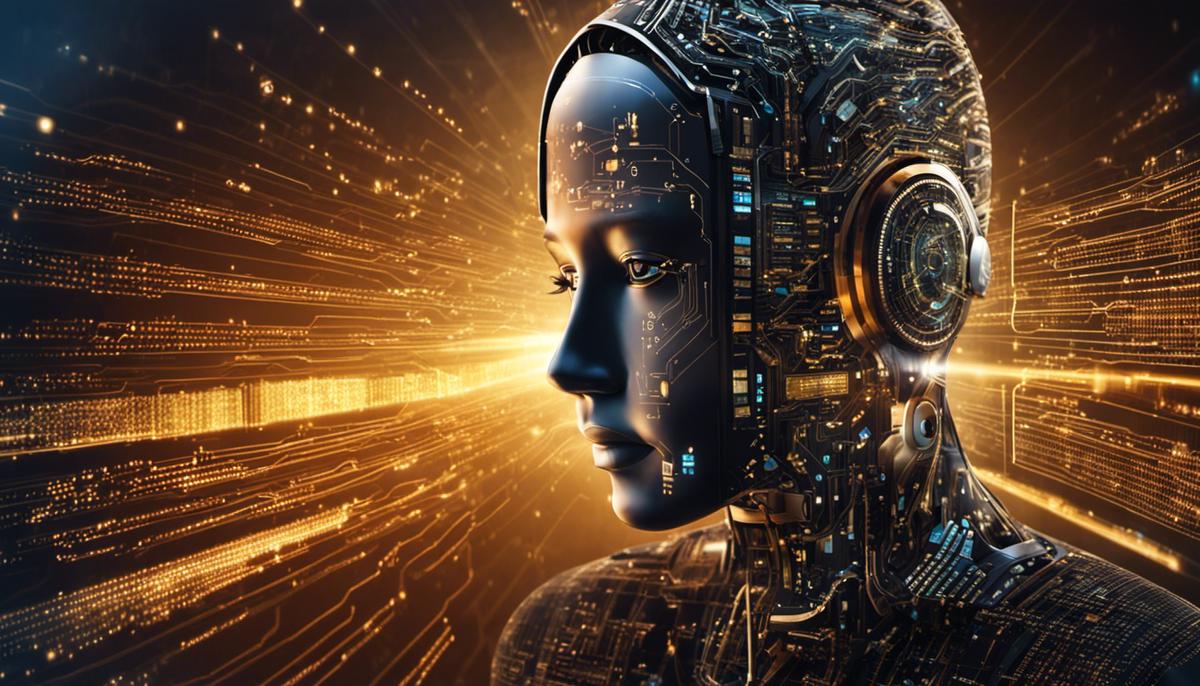In an era where our lives are rapidly being reshaped by groundbreaking technological advancements, being conversant with emerging innovations is both exciting and empowering. This discourse seeks to illuminate you on such key forefront advancements, from the seemingly abstract realms of Artificial Intelligence and Machine Learning to the revolutionary Blockchain Technology. Expanding our journey into the heart of the fast-evolving healthcare landscape, we explore the role of technology in redefining patient care and diagnostics. Further, we traverse into the infinitesimal world of Nanotechnology, exploring its promising and far-reaching applicability. Finally, keeping in sync with the pressing need for sustainable living, our focus will shift to the burgeoning sphere of Green Technology. It is a thrilling, enriching exploration, poised toward broadening your understanding of these impactful technologies shaping our present and sculpting the future.
Artificial Intelligence and Machine Learning
In this era of digital dawn, Artificial Intelligence (AI) and Machine Learning (ML) are revolutionizing the way we comprehend and interact with our technological reality. Their profound effect is such that scholars, policymakers, and the general populace express a range of responses, from excitement and awe to concern and apprehension. Arguably, these responses both stem from and fuel the game-changing potential of AI and ML; these transformative technologies are reshaping our reality in unprecedented ways.
Let’s dwell initially on the sector of transportation: AI, combined with ML algorithms, enables the development of autonomous vehicles. These self-driving machines have the potential to mitigate traffic congestion, reduce emissions, and eliminate a significant percentage of vehicular accidents caused by human error. Through continuous learning and immediate adaptation to changing circumstances, AI-powered vehicles unlock a new reality of safer, smarter, and more efficient transportation.
Another fascinating manifestation of AI and ML evolution is in the realm of healthcare. They have an immense potential in disease detection and diagnosis, prognosis, customizing treatments, and even in drug formulation. Machine learning algorithms rapidly evaluate vast datasets, leading to early detection of diseases such as cancer and Alzheimer’s Disease. Artificial intelligence in genomics affords insights into personalized patient treatment, heralding an era of precision medicine that holds transformative promise for human health.
AI and ML also dramatically influence our everyday life through sophisticated personal assistance. Virtual Personal Assistants, such as Siri and Alexa, sourced from AI and ML capabilities, are not only automating tasks but are also getting better at understanding our preferences and providing personalized suggestions. This philosophy extends to e-commerce platforms that provide personalized shopping experiences and social media platforms that tailor content to user preferences, fundamentally altering the way we shop and interact.
Let’s not forget the paramount impact on education; AI and ML have the potential to revolutionize learning experiences. The smart learning management systems, based on AI and ML algorithms, afford personalized curricula, dynamic content adaptation and prediction of student performance. These advancements change the dynamics of the learning process and propose a new reality of education that is more aligned to the unique needs of individual learners.
Furthermore, AI and ML applications influence global economics by automating complex tasks, thereby shaping future job markets, business operations, and global economies. The procedural automation leads to increased efficiency, cost-effectiveness and adaptability in fields as varied as finance, agriculture, manufacturing, and customer service, thus redefining traditional methods of operation.
However, as we embrace these profound shifts, it is of equal importance to critically reflect on ethical implications and potential challenges. The unclear lines of algorithmic accountability, threats to privacy, potential for job displacement, and susceptibility to manipulation are considerable issues deserving intensive attention.
Artificial Intelligence and Machine Learning are undeniably powerful forces catapulting us into a future that might be beyond our current comprehension. They unequivocally reshape our reality, introducing an era of digital transformation that promises tremendous potential, but also invites thoughtful deliberation on ethical and societal impacts. As we traverse this uncharted terrain, maintaining a balanced perspective on both profound possibilities and potential perils becomes imperative. The path to harnessing and molding this transformative power is indeed an exhilarating journey, one that invites and demands a discerning view.

Blockchain Technology
Blockchain Technology: A Revolutionary Approach to Social Systems
As our society progressively adopts digital forms, blockchain technology has increasingly exceptional significance. Its strength fundamentally pivots on its remarkable security and trustworthiness beyond the traditional internet. The application of this technology has the potential to transform not just economic transactions, but also social structures in multiple aspects.
In the sphere of identity verification, blockchain technology offers an emancipating shift from conventional ways. Blockchain could provide a decentralized structure for identity verification, making tedious and repetitive processes a thing of the past. This could revolutionize numerous sectors, such as banking, employment, travel, and law enforcement.
Turning to our political systems, blockchain-based electronic voting systems could overhaul existing electoral methodologies. A transparent, immutable record of votes would ensure the integrity of elections and decrease the likelihood of fraudulent practices. Additionally, the anonymity of blockchains could further ensure voter privacy, maintaining the sanctity of our democratic processes.
Our present financial system bears the potential for a radical transformation with blockchain technology. The unbanked and underbanked population stands to significantly benefit from decentralized financial services of distributed ledger technologies, levelling economic disparities. The introduction of smart contracts could also shape business transactions, providing transparent, secure, and autonomous contracts that auto-execute upon meeting predetermined criteria.
The arena of Intellectual Property Rights (IPR) might as well experience a seismic shift with blockchain technology. Artists, authors, and innovators can protect their creations using the immutable functionality of blockchain, ensuring a safe harbor for their individuality. Tokens tied to smart contracts can also facilitate transparent royalty payments, revolutionizing the current asymmetric distribution system in the art world.
Looking towards the energy sector, blockchain technology could accelerate the transition towards decentralized and green energy alternatives. Blockchain could efficiently manage energy transactions between consumers, producers, and prosumers, fostering peer-to-peer (P2P) energy trading. Hence, consumers could essentially become stakeholders in the energy production and distribution, democratizing the sector as a whole.
Blockchain technology also holds promise in supply chain management. It has the potential to create transparent, verifiable, and immutable records from the point of origin to the point of consumption. This can vastly increase the efficiency of supply chains, eliminate fraud, and bolster consumer confidence in ethical sourcing and manufacturing practices.
The role of blockchain in strengthening social justice movements should not be overlooked. Blockchain could provide reliable and transparent mechanisms for donations, guaranteeing direct delivery to the intended recipients. This will instill trust in donors, catalyzes more involvement and facilitates a more significant social impact.
Blockchain technology unquestionably possesses the potential to reshape our social structures, from identity verification to democracy, financial inclusivity to intellectual property, energy distribution to supply chain management, and beyond. However, it is imperative to remember the enduring necessity for ethical and regulatory frameworks. As with any technology, the utilization of blockchain for societal enhancement should prioritize the public interest above all.

Emerging Tech in Healthcare
Though strides have already been made in the realm of artificial intelligence (AI) and machine learning (ML) in the healthcare sector, indeed the burgeoning field of emerging technology continues to show promise for revolutionizing the landscape of medical services provision. This leap forward is conducted through numerous avenues, one of which is identity verification. Biometric identity verification, propelled by AI and ML, has the potential to ameliorate patient identification, hence, eliminating risks associated with misidentification such as medication errors and diagnosis discrepancies. A simple example of this is the introduction of facial recognition or voice authentication methods, significantly improving patients’ safety and personalizing healthcare provision.
Yet, the impact of AI and ML extends beyond the confines of hospitals and clinics. These technologies may also contribute significantly to electronic voting systems, enhancing the democracy of healthcare-related decisions. AI can analyse vast amounts of data rapidly, identifying patterns, trends or anomalies that allow for evidence-based decision-making in healthcare policies. Additionally, machine learning algorithms can predict election outcomes based on these patterns, enabling customized outreach and public awareness campaigns.
In addition to the transformation in policy-making, financial services and smart contracts are areas where AI and ML stand to have profound implications. Implementing blockchain technology for secure, smart contracts in the healthcare industry could streamline transactions; ensuring that they are transparent, immutable and executed automatically when conditions are met. This has the potential to revolutionize payment systems, healthcare records and insurance processing, alleviating the bureaucracy that often stifles efficiency.
When speaking of efficiency and rights, effectively managing intellectual property rights (IPR) in the healthcare industry is another potential game changer. The combination of blockchain technology with AI and ML can provide a relentless control over patents, trademarks and copyrights, inducing a novel cadre for collaborations and partnerships.
Amid talks of emerging technologies, one cannot overlook the potential of decentralized and green energy alternatives, underpinned by AI and ML. The incorporation of renewable energy sources, such as solar and wind power, within the healthcare sector will not only cut costs, but also contribute to environmental sustainability. Healthcare institutions, being major energy consumers, will set up a benchmark for other sectors to follow.
Emerging technologies can also revamp supply chain management. AI and ML can forecast demands, monitor inventory and optimize logistics, leading to a reduction in cost and an increase in efficiency and transparency. This can prove to be particularly beneficial during crises, ensuring timely availability of healthcare products.
Further, the tools of AI and ML might aid in strengthening social justice movements. These tools possess the potential to uncover and expose health disparities by analyzing health data and identifying trends. They could highlight areas where inequalities exist, a step forward in fighting against social injustices in healthcare provision. This is immensely valuable for the effective planning and implementation of public health interventions.
Finally, amidst this technologically-driven revolution, the importance of ethical and regulatory frameworks cannot be overstated. The potential for misuse of information and breach of privacy looms large, necessitating regulations that address these concerns while still fostering the growth and development of AI and ML in healthcare. Without such thoughtful deliberation and accountability mechanisms in place, the benefits of these technologies may be overshadowed by their risks.
In conclusion, these eight arenas represent a plethora of transformative possibilities that emerging technologies can bring to the healthcare sector. While the shift promises to streamline and enhance healthcare provision and policies, it shall be incumbent on us, the scientific community, to responsibly guide their implementation, balancing growth with potential risks. Indeed, the marvels of these technologies must be harnessed without compromising the ethics of healthcare, as we brace for an unprecedented wave of innovation in this new era of digital transformation.

Nanotechnology
Delving into the expansive vistas of nanotechnology, it’s crucial to remark on the multifarious applications that loom on the horizon. An entity which transcends the evanescent boundaries of disciplines, this technology, in its nascent stages of development, has prospects extending into areas once considered the realm of science fiction.
Sustainability is one such area wherein nanotechnology holds considerable promise. Tackling climate change, a challenge of global magnitude, might become feasible with nanotechnology. Nano-enabled solar cells could potentially be more efficient and less expensive than traditional photovoltaic devices, thus, accelerating the switch to renewable energy sources. In the realm of waste management, nanosensors could detect and filter pollutants, contributing to a cleaner and healthier environment.
In the domain of food science and agriculture too, nanotechnology promises impactful developments. Nano-encapsulated fertilizers and pesticides could release nutrients and pruners in a slow, steady manner, thus improving efficiency and reducing the environmental impact. Nanosensors can provide precise information on soil health or spot the early stages of a disease, enabling farmers to take timely action.
Yet, inside the realm of information technology, nanotechnology introduces an entirely new paradigm. Nanoscale transistors, the building blocks of all electronic devices, have been shrinking continually for over five decades. To enhance computational power, scientists are experimenting with 3D architectures and alternative conduction materials, discoveries that could revolutionize everything from smartphones to supercomputers.
Moreover, the healthcare industry stands to witness indelible transformations precipitated by the forays of nanotechnology. Nano-robots, an idea that may seem implausible today, could potentially be used to carry drugs to targeted cells or repair damaged tissues from within the body. Nanoscale bio-sensors could provide vital health data, facilitating proactive health management and personalized treatments.
Importantly, the growing influence of nanotechnology necessitates comprehensive regulations to ensure safe and equitable practices. As with any novel discipline, balancing the paramount importance of innovation with prospective risks is a challenging, yet essential endeavor. As society grapples with potential biological and environmental effects of nanomaterials, the research community must strive to address these concerns diligently.
Unquestionably, the potential of nanotechnology to transform our world is massive, and we are only scratching the surface of its possibilities. The nuances of exploring this microscopic world are infinite, weaving a tale of endless opportunities. Much like opening a doorway into an entirely new realm of imagination, the future of nanotechnology is pregnant with endless possibilities, blanketed under the anticipation of discovery. The saga of nanotechnology, in our imminent future, has just begun.

Green Technology
Unveiling the Green Technology Revolution: The Role in a Sustainable Future
In the quest for a sustainable future, green technology, with its myriad possibilities, shapes the cornerstone of our efforts. This field—steered by innovation, scientific knowledge, and a commitment to lessening environmental harm—incorporates a broad gamut, from renewable energy to digital transformations, such as Artificial Intelligence (AI) and Machine Learning (ML). This examination focuses on another cornerstone of green technology, often overlooked but steadily revolutionizing numerous industries – Nanotechnology.
Nanotechnology, the ability to manipulate materials at the atomic and molecular levels, promises transformative changes on the sustainability front, particularly in mitigating climate change effects. The controlled manipulation of such materials holds the capacity to develop cutting-edge, energy-efficient solutions. This could potentially revolutionize energy storage or even carbon capture and storage technologies, ultimately mitigating global warming.
Further, advancing nanotechnology stands to overhaul waste management protocols, contributing to a cleaner environment. By introducing nanomaterials, such as nano-adsorbents and nano-catalysts in waste treatment processes, waste management grows more efficient with higher pollutant removal and lower energy consumption. This development could significantly reduce our carbon footprint and efforts towards sustainability.
The intersection of nanotechnology with food science showcases another remarkable potential. Through nano-encapsulation techniques, fortification, or even smart packaging, nanotechnology could enhance food safety and nutrition quality. Furthermore, agriculture might bear witness to increased productivity and lesser environmental impacts, courtesy of Nano-fertilizers and Nano-pesticides, contributing to global food security in our collective sustainable future.
Revolutionary prospects of nanotechnology in the realm of Information Technology cannot be understated. Advancements in the creation of nanoscale transistors may redefine the boundaries of computational power, bolstering the efficiency and performance of electronics. Beyond mere hardware improvements, this could accelerate the capacities of AI and ML, amplifying their role in reducing green gas emissions and energy consumption.
The healthcare industry, too, stands to be transformed by nanotechnology. From targeted drug delivery systems, predicated on nanocarriers, to personalized treatments through Nanogenomics, the horizon of healthcare appears enlightened. Moreover, nanotechnology’s promise of sustainability aligns with the environmental health objectives integral to our future health infrastructure.
However, the implications of nanotechnology stretch beyond its benefits, into the realm of potential risks and inequalities. Therefore, enforcing comprehensive regulations to govern nanotechnology becomes imperative. Safeguarding against potential negative impacts on health and environment, and ensuring equitable and ethical nanotechnology practices should form the bedrock of policy formation to steer a clear path for these scientific advancements.
Indeed, the possibilities that nanotechnology presents are vast, with infinite opportunities waiting for exploration. As we traverse this journey towards a sustainable future, incorporating rigorous precautions and ensuring equitable practices will prove essential. Unquestionably, green technology, undergirded by AI, ML, blockchain, and nanotechnology, holds the key to our sustainable future.

Stepping back to ponder upon our journey through these emerging technological fields, we realize that the future indeed lies in the converging and maturing interface of these diverse innovations. From AI and Machine learning redefining notions of intelligence, Blockchain shaking up traditional transaction systems, the healthcare sector’s paradigm shift through integrated technology, to Nanotechnology revolutionizing material science and Green Technology leading us towards environmental sustainability – each field holds incredulous potential. Harnessing this potential for change requires informed citizens, ethical guidelines, agile policies, and a readiness to adapt. Let’s lean towards an informed, futuristic, and enriched vision of the world, exploring, questioning, and participating in the unfolding era of these emerging technologies.
